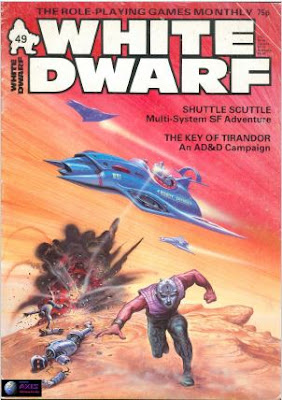In
case anyone was wondering why I decided to end this at issue 50, rather than go
all the way through the Fiend Factories, here’s as good an example as any. This
month’s theme is insect monsters. Pretty underwhelming, if you ask me, and
emblematic of a creative well running dry. Also, by this stage in the RPG
hobby, interest is shifting away from such dungeon-crawl elements as monsters,
traps and treasure, and moving towards story-telling gaming (often at the
expense of player freedom, but that’s another story).
For all that, though, there are still some interesting monster ideas on offer.
A
familiar face, Roger E Moore,
returns, to give us the Skullcatcher,
a kind of spider creature that likes to pull your head off. It requires pretty
much its own set of rules in order to accommodate this kind of targeted attack,
but in this case it’s not too clunky. I’d say, however, that the Darkmantle
occupies this particular niche in modern iterations of the game, and so this
doesn’t offer anything novel enough.
The
Giant Praying Mantis from Peter Stewart is a solid enough giant
insect creature, and definitely has utility as an ambush monster. But at the
end of the day it’s just that little bit too straightforward, and you may as
well use an Ankheg.
Phil Masters almost, once
again, got the star billing with his Drainwing,
a little moth-like creature that drains experience points and Constitution, and
is a regular size insect, unusual for this issue. However, in the end it would
work more like an effect than a monster, and on balance I wasn’t sure how to
convert the very 1st Edition XP drain effect into a more 5th
Edition mechanic. So, sorry Phil, but you’ve had plenty of goes at Monster of
the Week.
The
Golden Beetle from Steven Quayle is taken, apparently,
from The King Priests of Gor by John Norman. I’ve not read any of the Gor
series (partly because I’ve got plenty of pulp classic lined up for the
Appendix N series, and partly because as I recall, it’s a big oeuvre).
Anyway, the golden beetle is bizarrely hairy, looking a bit like if Boris Johnson was turned into a crab (we can but hope).
The golden beetle normally attacks with sleep-inducing scent glands, and then drains the body fluids of sleeping victims; in frontal attack it’s a lot less effective. So, again, just like Boris Johnson. There’s a nice little flavour note that these creatures have value on the drug market, and I like the idea of beetle glands being bought and sold as a narcotic.
In
the end I settled on the Giant Moth,
despite its rather unassuming name. A joint effort by Stuart Mole and Eric Wells,
the moth has a selection of interesting sonic-based attacks, making it easier
to convert compared to the Gloomwing, and more exciting than a giant mantis or
a Boris Johnson beetle.
|
Giant Moth |
||||||||||||
|
Medium beast, unaligned |
||||||||||||
|
Armour Class 12 Hit Points 18
(4d8) Speed 10 ft., fly 60 ft |
||||||||||||
|
||||||||||||
|
Proficiency Bonus +2 Skills Perception +5 Senses passive Perception 15 |
||||||||||||
|
Languages – |
||||||||||||
|
Challenge 1/2
(100 XP) |
||||||||||||
|
ACTIONS |
||||||||||||
|
Sonic Attack. The moth emits a 30-foot cone of ultrasonic sound. All
creatures within the area take 7 (2d6) thunder damage, or half that on a
successful DC 10 Constitution saving throw. Unattended objects take maximum
damage; attended objects get the same saving throw as the holder. Screech (Recharge 5-6).
The moth can emit a deafening screech. All creatures that can hear within a
30-foot radius must make a DC 10 Constiution saving throw or become deafened
for 1 hour. Creatures with keen hearing have disadvantage on the saving
throw. |










Comments
Post a Comment